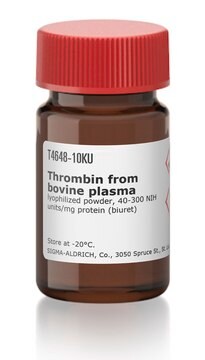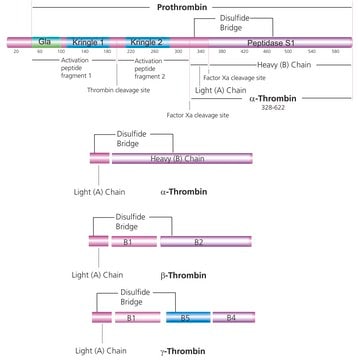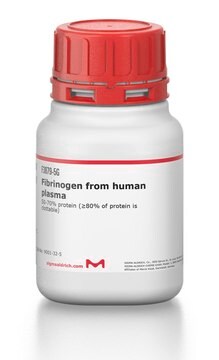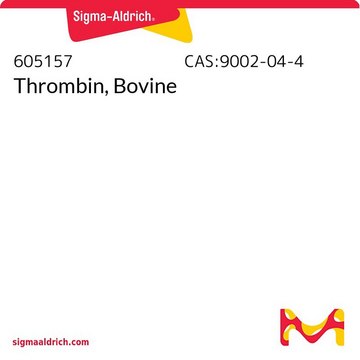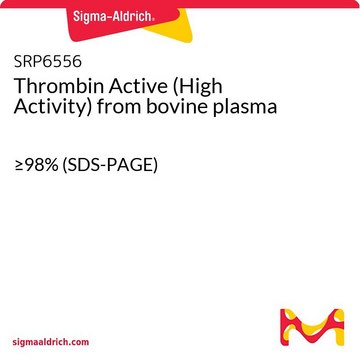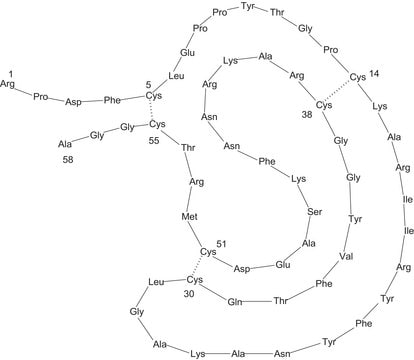T9549
Trombina from bovine plasma
powder, suitable for cell culture, ≥1,500 NIH units/mg protein (E1%/280 = 19.5)
Sinónimos:
Factor IIa
Iniciar sesiónpara Ver la Fijación de precios por contrato y de la organización
About This Item
Productos recomendados
form
powder
specific activity
≥1,500 NIH units/mg protein (E1%/280 = 19.5)
mol wt
heavy chain ~31 kDa
light chain ~6 kDa
technique(s)
cell culture | mammalian: suitable
UniProt accession no.
shipped in
dry ice
storage temp.
−20°C
Gene Information
cow ... F2(280685)
¿Está buscando productos similares? Visita Guía de comparación de productos
General description
Thrombin is the final coagulation protease in regard to hemostasis, promoting both procoagulant and anticoagulant effects.
Application
Thrombin is used for site specific cleavage of recombinant fusion proteins containing an accessible thrombin recognition site for removal of affinity tags. Thrombin has been used in a study to assess an expression and purification system for the biosynthesis of adenosine receptor peptides for biophysical and structural characterization.
Biochem/physiol Actions
Serín proteasa que hidroliza selectivamente los enlaces Arg-Gly en el fibrinógeno para formar fibrina y fibrinopéptidos A y B.
Unit Definition
Activity is expressed in NIH units, and is measured by direct comparison to an NIH thrombin reference standard.
Reconstitution
When reconstituted with 1 mL water, vial contains stated activity in 0.15 M sodium chloride and 0.05 M sodium citrate, pH 6.5.
Analysis Note
En el procedimiento de análisis NIH se utilizan 0,2 ml de plasma diluido (1:1 con disolución salina) como sustrato y 0,1 ml de muestra de trombina (estabilizada en una disolución de albúmina tamponada al 1 %), basado en una modificación del método de Biggs. Para determinar las concentraciones de trombina sólo se utilizan los tiempos de coagulación comprendidos entre 15 y 25 segundos.
La actividad se expresa en unidades NIH obtenidas por comparación directa con el patrón de referencia de la trombina NIH, lote K.
Other Notes
View more information on thrombin at www.sigma-aldrich.com/enzymeexplorer.
Inhibitor
Referencia del producto
Descripción
Precios
signalword
Danger
hcodes
Hazard Classifications
Eye Irrit. 2 - Resp. Sens. 1 - Skin Irrit. 2 - STOT SE 3
target_organs
Respiratory system
Storage Class
11 - Combustible Solids
wgk_germany
WGK 2
flash_point_f
Not applicable
flash_point_c
Not applicable
Elija entre una de las versiones más recientes:
¿Ya tiene este producto?
Encuentre la documentación para los productos que ha comprado recientemente en la Biblioteca de documentos.
Los clientes también vieron
Zachary T Britton et al.
Protein expression and purification, 84(2), 224-235 (2012-06-23)
Biophysical and structural characterization of G protein-coupled receptors (GPCRs) has been limited due to difficulties in expression, purification, and vitro stability of the full-length receptors. "Divide and conquer" approaches aimed at the NMR characterization of peptides corresponding to specific regions
Andrew F Uehlin et al.
Pharmaceutics, 14(2) (2022-02-27)
In this study, we report a biohybrid oriented fibrous scaffold based on nanofibers of poly(l-lactic acid) (PLLA)/fibrin produced by electrospinning and subsequent post-treatment. Induced hydrolytic degradation of the fibers in 0.25 M NaOH solution for various time periods followed by
Yuya Nakatani et al.
Archives of oral biology, 73, 172-178 (2016-10-25)
Platelet-rich plasma (PRP) is typically isolated and applied immediately after preparation, making it both a time- and labor-intensive addition to the operative procedure. Thus, it would be convenient if PRP could be preserved. We evaluated the efficacy of freeze-dried PRP
Sharon Wei Ling Lee et al.
Advanced healthcare materials, 9(7), e1901486-e1901486 (2020-03-04)
Polymer nanoparticles (NPs), due to their small size and surface functionalization potential have demonstrated effective drug transport across the blood-brain-barrier (BBB). Currently, the lack of in vitro BBB models that closely recapitulate complex human brain microenvironments contributes to high failure
Mikaël M Martino et al.
Biomaterials, 30(6), 1089-1097 (2008-11-26)
The extracellular matrix (ECM) exerts powerful control over many cellular phenomena, including stem cell differentiation. As such, design and modulation of ECM analogs to ligate specific integrin is a promising approach to control cellular processes in vitro and in vivo
Nuestro equipo de científicos tiene experiencia en todas las áreas de investigación: Ciencias de la vida, Ciencia de los materiales, Síntesis química, Cromatografía, Analítica y muchas otras.
Póngase en contacto con el Servicio técnico